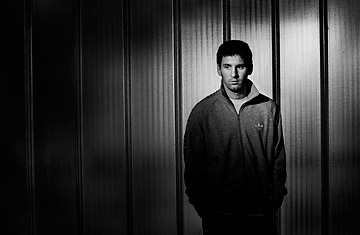
Lionel Messi of FC Barcelona, photographed Jan. 11, 2012
(3 of 3)
With so much else to cry for in Argentina in the past couple of decades — its economy left in the dust by Brazil's, its domestic football league a violence-prone wreck — the national football team is disproportionately significant in this proud country. It wears on Messi. "When he returns from a national game, we all worry about his emotional state," says Sandro Rossel, Barca's president. Fingers were pointed at him after Argentina's poor showing in South Africa, where it was thumped by Germany in the quarter-finals: Messi was scoreless in five games.
But the lowest point for Messi came last July, only weeks after he had won both the Champions League and La Liga with Barca. When Argentina drew 0-0 with Colombia in Messi's native province of Santa Fe, fans began to hurl abuse at him. "Maradona! Maradona!" they screamed, making a mocking comparison between Messi and the former superstar. More hurtfully, they yelled, "Mercenary! Catalonian!" In the dressing room after the game, defender Nicolás Burdisso faced down Messi, screaming, "Get your act together, brat!" (Imagine Michael Jordan being chewed out by, say, Christian Laettner after a game at the 1992 Olympics.)
Burdisso subsequently apologized, and some Santa Fe fans went to the next game at the stadium with banners pleading for Messi's pardon: FORGIVE THEM, LEO, THEY KNOW WHAT THEY SAY! AND THANK YOU FOR SO MUCH! FORGIVE US FOR SO LITTLE! Messi says that since then, he's felt less hostility from his countrymen. In Rosario during his Christmas break, he noticed there was less criticism of him on TV sports shows. "Before there was a lot of criticism and everything was bad," he says. "And now it's not like that. That's good, because every country I go, people have always received me very well, and in my own country that wasn't happening."
Still, there's no disguising what his countrymen want most from Messi. "Until he wins a World Cup for Argentina, [the fans are] going to keep yelling 'Maradona' at him," says Julian Moncalvo, who manages a restaurant in the trendy Palermo Hollywood district of Buenos Aires. For this prodigal son, coming home isn't enough: he is expected to bring the fatted calf too.
On the horizon is a tantalizing opportunity for Messi to secure his rightful place in Argentine hearts: the next World Cup, in 2014, will be in Brazil, Argentina's great rival. Messi will be 27, the peak age for a football player; Maradona was 25 when he won the Cup in '86. If Messi can match Maradona's achievement, he will not only prove his commitment to his country, he will likely surpass Pelé and Maradona as the best player ever. "I think the record books have to record him as a World Cup winner for him to be accepted as the greatest player of all time," says Gavin Hamilton, editor of World Soccer magazine.
Messi says the World Cup is his ultimate ambition, but he is careful to couch it in terms of what it will mean for his country, not for his place in the game's history. "I hope it's the moment for Argentina and that we can become champions. I'm going because I want to be champion and share the World Cup with my national team."
And what if the World Cup isn't in his destiny? Opinion is divided on how history will judge Messi if his display cabinet lacks that one winner's medal. Pelé, who jealously guards his title as the greatest, has sniffed that the Argentine has a long way to go before being considered his equal. "When Messi's scored 1,283 goals like me, when he's won three World Cups, we'll talk about it," he told the French daily Le Monde in an interview published Jan. 20.
Pelé has three World Cup winner's medals, but he got them when the Cup was the only competition in which the world's top players faced off, and quadrennially at that. These days, the annual UEFA Champions League is arguably a bigger and more grueling gladiatorial contest. Lineker says the league is comparable to the Cup "because you've got all the best players in the world playing in it for the biggest clubs week in, week out."
By that reckoning, Messi may already have done enough to turn football's divine duopoly into a holy trinity: Pelé, Maradona, Messi. But that's not enough for the man who sobs after a lost game, who is known to storm off the pitch if he loses a rondo, or training-ground contest: he needs to keep playing, keep winning and (defenders of the world, beware!) keep getting better. "There's still a lot of time to prepare and to improve," he says.
It's hard to imagine how he can still improve. His skills are already so unreal that Arsene Wenger, manager of the English club Arsenal, compared him to virtual players in PlayStation games. Not coincidentally, those are his favorite pastime off the real pitch. At the end of our interview, I ask if, when he plays a football video game, he picks the virtual Messi to be on his team. "Of course," he replies, with only the faintest hint of swagger. "How else can I win?"
— with reporting by Uki Goni / Buenos Aires, Glen Levy / London and Lisa Abend / Barcelona
